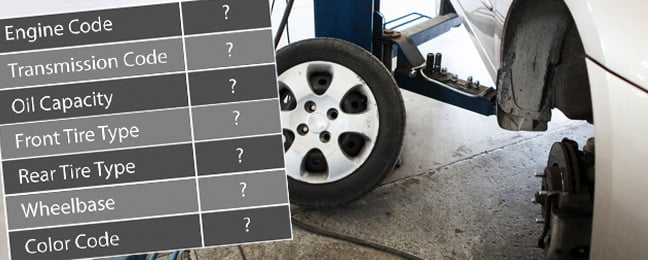

Mar 7 2016
Every vehicle service business needs a VIN decoding solution. Whether you are a dealer service department, independent garage, or auto body shop, the ability to identify vehicle details, specs, and compatible parts is necessary for an effective and efficient business. There are several VIN decoders to choose from, however, some are far more basic than others.
Though it may be tempting to choose the less expensive, or free, VIN decoding option, keep in mind that there may be a reason why it's so inexpensive. In this article, we've highlighted five reasons why a basic VIN decoder simply will not cut it for your auto service business and will leave you needing more.
A VIN number encodes very few vehicle details and specs. In fact, the only vehicle details you can expect from the VIN alone are the vehicle type, basic engine details, drive type, body style and doors, restraint, and GVW Range. Check out this article for more detailed descriptions.
Your Auto shop needs much more vehicle information than what's encoded in the VIN number. Many of the basic VIN decoding solutions offer a very limited amount of vehicle data and require the use of additional solutions or resources to obtain all necessary vehicle information.
An advanced VIN decoding solution can provide an extensive vehicle database that captures many more vehicle details & specs than what's encoded in the VIN or what a basic VIN decoder offers.
Many VIN decoding solutions are unable to decode newer vehicles right away.
Though new vehicles won't require maintenance until they rack up some miles and hopefully won't be breaking down for quite some time after purchase, there's no guarantee that they are void of issues. When newer vehicles need to be serviced, it's important that the VIN can be decoded. This means finding a vehicle data provider who is constantly updating their database throughout each model year, even before new vehicles hit the dealer lot.
The majority of auto shops looking for a VIN decoding solution are hoping to obtain vehicle parts data. This is information that cannot be obtained directly from the VIN. And most vehicle data providers do not capture vehicle parts data as part of their solution. However, some of the more comprehensive VIN decoding solutions will offer mapping to a 3rd party vehicle parts catalog such as the Auto Care Association's Aftermarket Catalog Enhanced Standard (ACES).
Vehicle parts data should not be the extent of a VIN decoding solution's mapping offerings. Recall information can also be a valuable data mapping, among others. A basic VIN decoder that cannot provide seamless mapping makes more work for your business. And if you don't have technical employees on hand, integration of the two datasets would require help from an outside source.
OEM service schedules and service bulletins are both valuable data sets for most auto service businesses. They can be utilized for marketing maintenance and services to existing customers through email, texting, and paid advertising. Service schedule data is also valuable for service center technicians looking to obtain technician notes from the OEM.
Vehicle service schedule and service bulletin data is often acquired separately from a VIN decoding service and not easily obtained from the OEMs. Choosing an advanced vehicle data solution that ties this data to the VIN and vehicle ID is definitely worth the extra cost for the value it offers. If you aren't already leveraging OEM service schedules or service bulletins to generate more business and increase efficiency, you are missing out.
It's important for service shops to identify which vehicle components or parts are still under the manufacturer warranty, as it will often affect the vehicle owner's decision to move forward with the service. Some OEMs will offer warranties for major vehicle components that last as long as 10 years or 100k miles, such as the 2016 Hyundai Sonata and Mitsubishi Outlander powertrains. This is something vehicle owners may not have been aware of when they initially made the purchase. Especially if they bought it used with a decent amount of miles.
Gathering all the warranty data individually from each OEM is not the ideal solution. Fortunately, this will not be necessary if you utilize a VIN decoding solution that ties this data to the VIN.
Resist your urge to take the cheaper route in settling for a basic VIN decoder. Choosing the best VIN decoding and vehicle data provider will benefit your business significantly, allowing vehicle details and service data to be accessed all in one business solution.